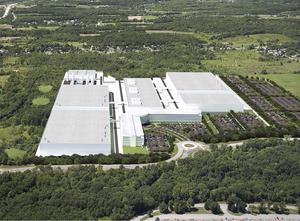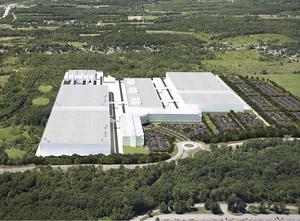
Nanotechnology draws from physics, chemistry, engineering, computation, etc., and this multi-disciplinary nature has served as a major speed bump in achievement of envisioned nanotech goals. There has been substantial concern that the U.S. is lagging behind other countries in nanotech R&D. Now researchers, companies, and politicians are coming together to create a much-needed physical hub for promoting and funding multi-disciplinary progress toward advanced technologies. The location: New York. The focus: chips.
Recently described at UticaOD.com in an article entitled New York State: Building a Nano Empire :
For at least a decade, major nanotechnology players have been attracted by the intellectual center SUNY’s College of Nanoscale Science and Engineering has created in Albany. And now, Gov. Andrew Cuomo’s 2011 announcement of a $4.8 billion partnership with private companies — including Intel, Samsung, TSMC, IBM and Global Foundries — to develop the next generation of computer chip manufacturing is gaining traction.
“The biggest companies are behind it,” Singer said. “They really believe it will give them the competitive edge that will make it unbeatable, and they have the wherewithal to make it happen.”
And biotech is getting in on the action. Earlier this summer, SUNY CNSE announced a biotech partnership aimed at “nanotech-enabled cancer research”:
Albany, NY and Pittsfield, MA – Underscoring the strategic blueprint of Governor Andrew M. Cuomo in fueling New York’s growing reputation as a hub for nanotechnology-enabled innovation, SUNY’s College of Nanoscale Science and Engineering (CNSE) and Pittsfield, Massachusetts-based Nuclea Biotechnologies, Inc. (Nuclea) today announced the launch of a $1 million research partnership to enable the development and commercialization of a high-throughput nanochip to accelerate the diagnosis and treatment of breast, colon, prostate and other cancers.
“Driven by the vision and leadership of Governor Andrew Cuomo, New York is recognized as the leading global hub for nanotechnology education and innovation, including an expanding footprint in critical 21st century fields such as life sciences,” said Dr. Alain E. Kaloyeros, CNSE Senior Vice President and CEO. “This public-private partnership with Nuclea Biotechnologies expands CNSE’s cutting-edge research in the nanobioscience arena, and further illustrates its role in accelerating advanced technologies and attracting high-tech companies to New York.”
“This research agreement is a perfect marriage of biotechnology and nanotechnology,” said Patrick Muraca, President and CEO of Nuclea. “CNSE’s global reputation as the world leader in nanoscale engineering will lend critical expertise in developing the miniature version of our protein chip, which is an important element for us as we work toward commercialization. We’ve assembled a great team and look forward to this collaboration with CNSE.”
Chips, which are for the most part continuing on cycles of iterative miniaturization and are still on the millimeter (bulk) scale despite the use of the term ‘nanotechnology’, remain indisputably relevant to near-term advanced technologies. Do these NY-based efforts help restore the standing of the US in global nanotech R&D?
-Posted by Stephanie C


